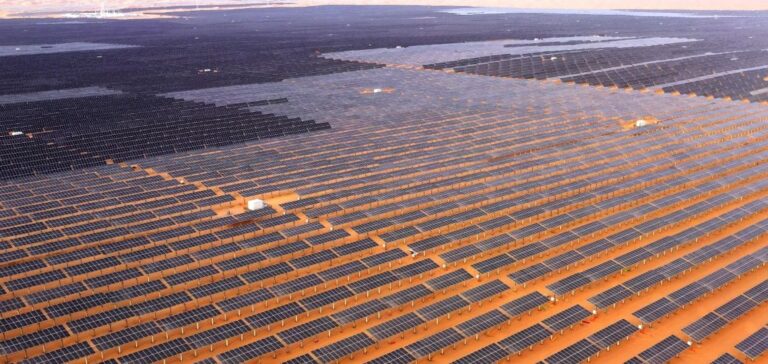Chinese companies set a new record in 2024, with 24 gigawatts (GW) of new energy capacity installed in partner countries of the Belt and Road (B&R) initiative. This volume doubles the installations in 2023 and represents the highest level since the initiative’s launch in 2013, according to a Wood Mackenzie report titled *”Record Chinese overseas power project completion in 2024: Update on the Belt & Road Initiative.”*
Approximately 52% of these new capacities focused on renewable energy, including 8 GW of solar projects and 5 GW of hydropower projects. Solar energy led the development of renewable capacities, accounting for two-thirds of such projects in 2024. However, thermal sources remain significant, comprising 48% of installations, split between 6 GW of coal-fired plants and 6 GW of gas and oil plants.
A Key Tool in Chinese Energy Diplomacy
Since the launch of the B&R initiative, China has leveraged energy projects as a diplomatic tool in developing countries. This strategy is supported by Chinese manufacturers’ ability to reduce the costs of renewable technologies, making them more accessible to emerging markets. These markets, previously constrained by budget limitations, now see these investments as an opportunity to meet their growing energy needs.
Alex Whitworth, Vice President and Head of Asia-Pacific Power and Renewables Research at Wood Mackenzie, stated: “Chinese companies are accelerating access to affordable and sustainable energy solutions in many emerging markets, thus consolidating their regional influence.”
Challenges remain, however. China’s 2021 policy banning the financing of new overseas coal plants has affected 19 GW of coal projects still in the pipeline, some of which risk cancellation. At the same time, 9 GW of gas projects are under construction or planning, offering a temporary alternative in these countries’ energy transitions.
Asia at the Heart of Priorities
Asia accounts for 70% of the energy capacities installed under the B&R initiative, confirming its strategic importance for China. The primary beneficiaries include countries such as Pakistan, Indonesia, Vietnam, Saudi Arabia, and Malaysia.
Chinese projects are also gaining ground in renewable energy. While they accounted for only 7% of wind and solar capacities in these markets five years ago, this share has now surpassed 60% in 2024. If this trend continues, their share could reach 80% by 2030, according to Yanqi Cao, Consultant in Asia-Pacific Power Research at Wood Mackenzie.
A Lasting Influence on Emerging Markets
Since 2013, China has installed 156 GW of energy capacity in B&R countries, a figure equivalent to 1.5 times Australia’s total energy capacity in 2024. This dynamic highlights China’s ambition to strengthen diplomatic and commercial ties through large-scale energy projects. As renewable energy gains prominence, it is becoming not only a driver of economic growth but also a geopolitical tool for Beijing.






















